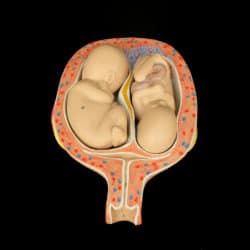POLYCYSTIC OVARIAN SYNDROME (PCOS), Nathan Fox, MD (Digital)

Polycystic ovarian syndrome (PCOS) is a common cause of infertility in the United States. This syndrome affects 5 to 10 percent of all women of reproductive age. PCOS is characterized by oligomenorrhea (irregular periods), hyperandrogenism (high levels of testosterone and other hormones), chronic anovulation, and insulin resistance. Pregnancy Loss and Polycystic Ovarian Syndrome Early pregnancy
LONG QT SYNDROME (LQTS), Nathan Fox, MD (Digital)

Long QT syndrome (LQTS) is a cardiac rhythm disorder with a risk of sudden death. Myocardial repolarization causes LQTS and shows a prolonged Q-T interval on electrocardiogram (ECG) test. This repolarization causes a particular ventricular tachycardia, known as torsades de pointes. Women may experience heart palpitations, syncope, seizures, and cardiac arrest. How do you develop
EARLY SYMPTOMS OF PREGNANCY, Nathan Fox, MD (Digital)

Early Pregnancy Symptoms The earliest signs of pregnancy will vary for most women. There are some women who don’t notice pregnancy symptoms of their first trimester, but for some, they realize they are pregnant before missing their first period. If you are enthusiastically waiting, here are some common early symptoms of pregnancy. Tender Breasts You
UNDERSTANDING TWIN-TWIN TRANSFUSION SYSTEM (TTTS), Nathan Fox, MD (Digital)

Twin-twin transfusion syndrome (TTTS) is identified when blood flows unequally between monochorionic twins or twins that develop in the same placenta. This condition occurs in about 10 to 15 percent of monochorionic twin pregnancies. There is no concrete evidence of the development or genetic causes of TTTS. Symptoms of Twin-Twin Transfusion Syndrome Twin-twin transfusion syndrome
CAN WE PREVENT PREECLAMPSIA?, Nathan Fox, MD (Digital)

Preeclampsia refers to a pregnancy-specific medical condition where the woman experiences high blood pressure, high levels of protein in the urine, and abnormalities in the placenta around or after 20 weeks of pregnancy. Typically, this condition resolves after delivery, however, some women have postpartum preeclampsia and continue to have symptoms for several days or weeks
GESTATIONAL DIABETES MELLITUS, Nathan Fox, MD (Digital)

What is Gestational Diabetes Mellitus? The definition of gestational diabetes mellitus (GDM) is glucose intolerance recognized and diagnosed during pregnancy. This diagnosis is for women with any form of treatment, such as insulin and diet modifications, and whether the condition continues after pregnancy. GDM affects approximately 7 percent of all pregnancies, which is more than
HOW CAN PREECLAMPSIA AFFECT ME AND MY BABY?, Nathan Fox, MD (Digital)

A preeclampsia diagnosis for a pregnant woman may increase anxiety of the outcome and health of herself and her baby. Preeclampsia is a potentially life-threatening condition and doesn’t have significantly noticeable symptoms. However, if you visit your doctor regularly and receive proper screening and testing, preeclampsia can be diagnosed and monitored for a positive outcome. Still,
LABOR CERVICAL EXAMINATION SIMULATION IN EDUCATION, Nathan Fox, MD (Digital)

As of now, the most common method of teaching cervical examinations for women during labor includes medical students performing an examination before or after the teacher performs the same analysis. This way of teaching has the possibility to increase patient discomfort or anxiety. Additionally, prior studies have shown poor reliability with this method of instruction.
STROKE AND PREGNANCY, Nathan Fox, MD (Digital)

Since stroke is rare in women of child-bearing age, there is not a large pool of data regarding women with a history of stroke who become pregnant. However, the risk of recurrent ischemic stroke is likely low. In one review, 441 women with a history of ischemic stroke were evaluated (373 with arterial ischemic stroke
WOMEN WITH A HISTORY OF INTRAUTERINE FETAL DEATH (IUFD) IN A PRIOR PREGNANCY, Nathan Fox, MD (Digital)

Intrauterine fetal death, also known as stillbirth, is usually defined as a death in utero greater than 20 weeks of gestation and/or at a weight of greater than 500 grams. The fetal death rate in the United States is approximately 7 per 1,000 total births and accounts for approximately half of perinatal mortality, or fetal







